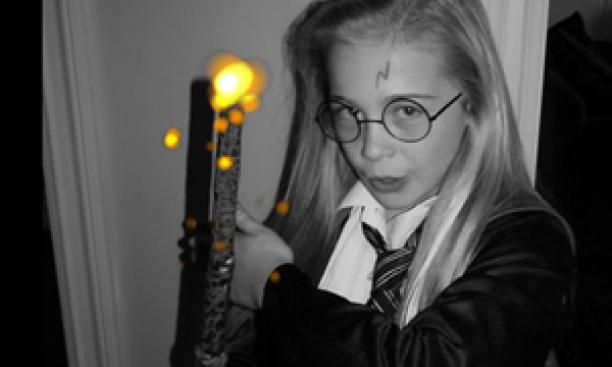An image from Jessica Welsh '14's "The Dark Lord's Wife," based on a story by Welsh's 10-year-old sister. (Courtesy Jessica Welsh '14)
The final project for VIS 261 comes with only one guideline: a five-minute time limit. This fall, eight students in Introductory Video and Film Production wrote and directed their own short films, under the guidance of professor Keith Sanborn. A screening of the students' work was held at the Lewis Center for the Arts on Tuesday night.
According to Sanborn, the class is not so much about technical skills as it is about “learning how to see.” “I want students to get in touch with their own imaginations,” he said. They practice the nuts and bolts of the filmmaking process, including lighting, camerawork, and sound editing, but they are encouraged to “take what they need” and “find their way.”
Judging by the diverse showing, Sanborn's students took that message to heart. Their short films encompassed a wide range of styles, from photo montage to documentary to point-of-view cinematography.
Rivka Cohen '12 offered a heartfelt paean to home and friendship with her film, “This Is NOT a House,” set in her West Virginia backyard. Agisae Kim '15 tackled everyday “insincerity” in “This Is You,” which featured subtitles revealing the inner thoughts of characters as they spoke.
Several films were adaptations of other media. Freshman Ambika Vora's “Confrontation” was a live-action rendering of the Japanese anime Naruto, and sophomore Jessica Welsh's “The Dark Lord's Wife” was a Harry Potter sequel written and narrated by her 10-year-old sister. Welsh's film consisted of black-and-white still photographs animated in the montage style of “La jetée,” a French film Sanborn screened for the class. Dimitris Papaconstantinou '13 was similarly inspired by Gaspar Noé's Enter the Void to shoot his own film entirely in first-person.
The only documentary in the slate was directed by Christina Maida '14. Inspired by the Fifty People One Question project, Maida filmed Nassau Street passersby answering the question, “What is your biggest fear?” Maida was drawn to the “real emotion” elicited by the documentary form. She is now enrolled in Advanced Video and Film Production and plans to pursue a film certificate.
Not all of the students were set on becoming filmmakers, but they all left the class with a better sense of what that path would take. Papaconstantinou said he gained “more confidence in [his] creativity,” and Welsh applauded the class's camaraderie. “My favorite part of the semester was getting to know the other students in the class through their films,” she said. “Every creative aspect of a project, from something as broad as subject choice to something as small as the placement of a cut between shots, can tell you something about the filmmaker. It was inspiring to work with such a diverse and talented group of people.”

Vicky Gan ’13 is a history major from Baltimore, Md.




